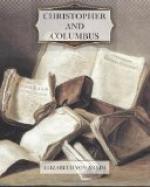Then Edward’s voice, raised and defiant—surely defiant?—came through the crack in the door, and every word he said was quite distinct. Anna; supper; affection ... Mrs. Twist sat frozen. And then the door was flung open and Edward tumultuously entered, his ears crimson, his face as she had never seen it and in each hand, held tightly by the arm, a girl.
Edward had been deceiving her.
“Mother—” he began.
“How do you do,” said the girls together, and actually with smiles.
Edward had been deceiving her. That whole afternoon how quiet he had been, how listless. Quite gentle, quite affectionate, but listless and untalkative. She had thought he must be tired; worn out with his long journey across from Europe. She had made allowances for him; been sympathetic, been considerate. And look at him now. Never had she seen him with a face like that. He was—Mrs. Twist groped for the word and reluctantly found it—rollicking. Yes; that was the word that exactly described him—rollicking. If she hadn’t observed his languor up to a few minutes ago at supper, and seen him with her own eyes refuse champagne and turn his back on cocktails, she would have been forced to the conclusion, dreadful though it was to a mother, that he had been drinking. And the girls! Two of them. And so young.
Mrs. Twist had known Edward, as she sometimes informed Edith, all his life, and had not yet found anything in his morals which was not blameless. Watch him with what loving care she might she had found nothing; and she was sure her mother’s instinct would not have failed her. Nevertheless, even with that white past before her—he hadn’t told her about “Madame Bovary”—she now instantly believed the worst.
It was the habit of Clark to believe the worst. Clark was very small, and therefore also very virtuous. Each inhabitant was the careful guardian of his neighhour’s conduct. Nobody there ever did anything that was wrong; there wasn’t a chance. But as Nature insists on a balance, the minds of Clark dwelt curiously on evil. They were minds active in suspicion. They leapt with an instantaneous agility at the worst conclusions. Nothing was ever said in Clark, but everything was thought. The older inhabitants, made fast prisoners in their mould of virtue by age, watched with jealous care the behaviour of those still young enough to attract temptation. The younger ones, brought up in inhibitions, settled down to wakefulness in regard to each other. Everything was provided and encouraged in Clark, a place of pleasant orchards and gentle fields, except the things that had to do with love. Husbands were there; and there was a public library, and social afternoons, and an Emerson society. The husbands died before the wives, being less able to cope with virtue; and a street in Clark of smaller houses into which their widows gravitated had been christened by the stationmaster—a more worldly man because of his three miles off and all the trains—Lamentation Lane.




